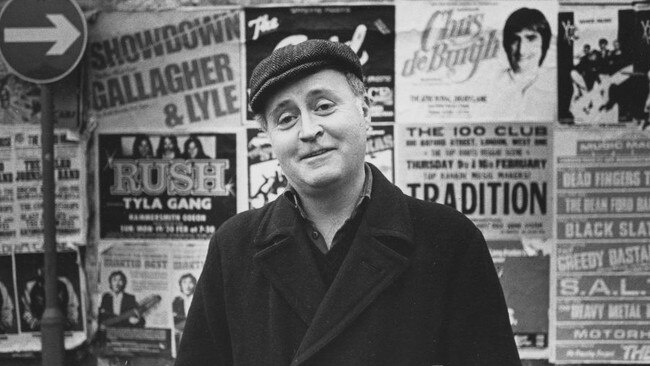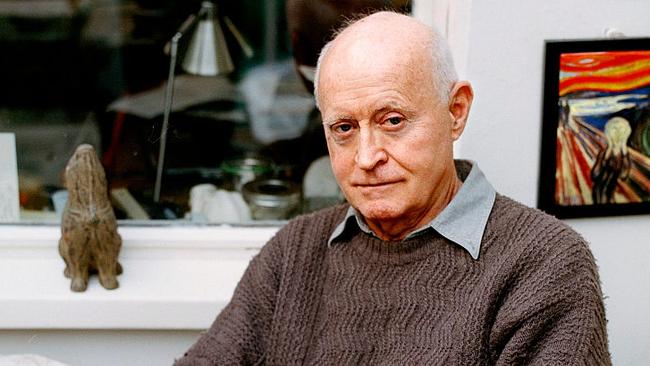Edward Bond obituary: playwright whose brazen works ultimately defeated the censor
Edward Bond rose from a working-class background to make an indelible mark on theatreland.

OBITUARY
Edward Bond Playwright
Born London, July 18, 1934; died London, March 3, aged 89
In 1965 Edward Bond opened an envelope containing the manuscript of his play Saved and felt a surge of fury pulsing through his veins. The Lord Chamberlain, Britain’s theatre censor, had ordered 50 changes.
“It came back marked with a blue pencil with this line out, that page out and so on. I was incensed and outraged that somebody I didn’t know could treat me in that way,” Bond recalled. “It’s not obstinate to stand up for one’s rights.”
His refusal to negotiate with Lord Cobbold ultimately led to the end of 231 years of British theatre censorship. William Gaskill, artistic director of the Royal Court, exploited a loophole by presenting the play as a club production. Audiences paid a nominal membership fee, meaning that Saved was no longer subject to censorship laws.
Even some liberal-minded critics wished Lord Cobbold had got his way after witnessing one of the most shocking scenes in the history of theatre: boys stoning to death a baby in its pram. “I write about violence as naturally as Jane Austen wrote about manners,” Bond said. “Violence shapes and obsesses our society, and if we do not stop being violent we have no future.”
Undeterred and unapologetic, he booked another date with the censors when his next play, Early Morning, was staged by Gaskill at the Royal Court in 1968. In a savagely iconoclastic and satirically surrealistic play, Queen Victoria is presented as Florence Nightingale’s lover, the royal princes appear as Siamese twins, and Albert and Disraeli help to stage a murderous coup. Several scenes are set in heaven, where cannibalism is practised. Designed to show the present a distorted image of itself disguised as a Victorian grandparent, Early Morning was challenging even by Bond’s standards.
Lord Cobbold rejected it en bloc and tried to stop the Court resorting to the charade of turning the theatre into a club. Gaskill went ahead anyway, with a private performance attended by police officers and members of the vice squad.
And though the play, which featured Marianne Faithfull as Florence, soon was cancelled, it proved to be theatre censorship’s last throw. A parliamentary committee recommended that the 1843 Theatres Act be scrapped. The bill to abolish it became law a few months later.
New enfants terribles would emerge to stage more shocking plays thereafter, but Bond had made his reputation as the most controversial British playwright of the post-war period, whose self-confessed mission was to ensure “the crisis in the human species” was seared into the imagination of his audience, and the more disturbingly the better.
Themes such as poverty, madness, injustice and dehumanisation were explored in more than 50 works, renowned for their sharp, spare dialogue in staccato scenes.

A Marxist, the working-class-born Bond saw theatre in didactic, Brechtian terms as a means to make a political statement. “Everything is about the relationship between the human being and society. Theatre is a user manual for life.”
And if the plays were bleak, he often meant them to be funny. Indeed, Bond’s fear about his work being misunderstood bordered on paranoia. He would insist on directing them himself to ensure that he could draw out the humour from actors. Small and stocky, he could be an intimidating figure in rehearsals with his high forehead and accusing eyes framed by severe steel horn-rimmed spectacles.
Max Stafford-Clark, former artistic director of the Royal Court, wrote of how Bond would “reduce a talented cast into a stumbling and incoherent shambles of walking wounded. Edward Bond is simply the most difficult person I have worked with in 40 years.”
After being directed by Bond in the play Restoration, Simon Callow wrote his acclaimed book Being an Actor, which contains cogent advice, based on his distressing experience with Bond, on how thespians can stand up for themselves.
Eventually Bond was ostracised from London’s theatrical mainstream but was by no means universally disliked. An actor once laughed in his presence for no apparent reason. When Bond asked why, he was told that they had heard so many nasty things about him and they were laughing from relief.
In later years he enjoyed a revival. The Sea was staged in the West End in 2008 and in 2011 the Lyric Theatre in Hammersmith presented the first London production of Saved for 27 years. His final play, Dea, was a Greek tragedy replete with murder, rape, incest, dismemberment and necrophilia, which Bond claimed “brought back some dignity to our theatre”.
The Times





